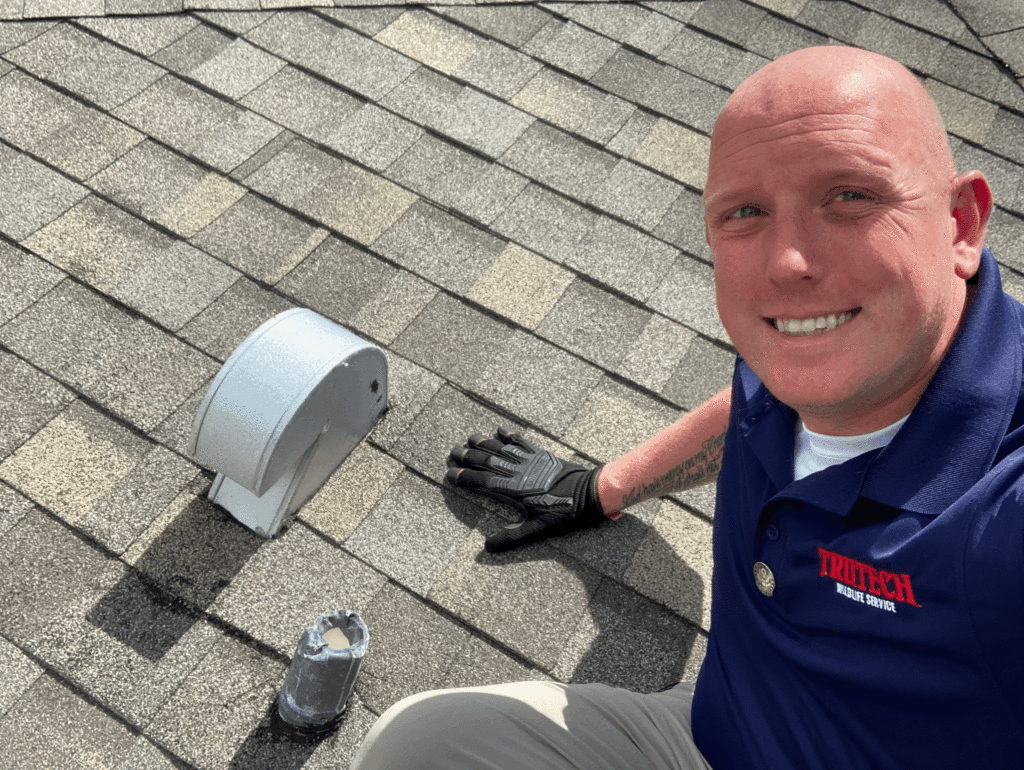Squirrel Removal in Fort Myers, FL
Do you need to get rid of squirrels in Fort Myers, FL? We can help!
Some Geographic Restrictions

Squirrels in Southwest Florida
Southwest Florida is home to the eastern grey squirrel, fox squirrel, and Southern flying squirrel. These squirrels can often be seen in parks, residential areas, and wooded areas in and around Fort Myers. Squirrels typically create nests in attics or inside wall cavities.
If you have woken up to the sound of scurrying above your head, you may have a problem with squirrels in your attic. Before you spend time and money creating clever ways to trap squirrels on your property, call the experts at Trutech to perform a humane squirrel removal.
Our team of dedicated experts at committed to helping you regain your peace of mind and your property. Don’t wait until squirrels have destroyed your yard, home, or sanity- Call in a team of specialists from Trutech to perform a humane squirrel removal and control service in your home or garage!
Squirrel Removal Services

Squirrel Trapping
A squirrel trap or one way door is the most effective means of squirrel removal. Either a one-door or two-door cage trap works the best to catch squirrels. A squirrel excluder allows a squirrel to exit but prevents reentry. At Trutech, we can use a squirrel trap and excluder in conjunction with one another.

Squirrel Exclusion
Squirrel exclusion is the most effective long term squirrel control for your property. Squirrels only need a few inches to gain access to your attic. Their teeth can gnaw through shingles, wood, and some metals to create a big enough gap.

Repairs and Restoration
Steps can be taken to make yards less attractive to squirrel populations. Thinning out dense branches, removing easily accessible food sources, and implementing squirrel baffles to protect birdfeeders all reduce the possibility of drawing squirrel infestations. Tightly seal all possible entrances, such as gaps around siding, vents, chimneys, and windows, to keep squirrels out of homes.
Squirrel Problems

Evidence of a Squirrel Infestation
In Fort Myers, the Eastern Gray squirrel is the most common pest squirrel. The fox squirrel and Southern flying squirrel are also present.
The first signs of a squirrel include unidentifiable noises as they scamper through your attic and walls. If you notice strange noises early in the morning, it’s likely a squirrel in the attic.

Dangers of Squirrel Infestation
Some Geographic Restrictions
Frequently Asked Questions
Flying, tree, and ground squirrels can carry a number of diseases transmissible to humans. These members of the rodent family are carriers of tularemia, leptospirosis, and other illnesses common in rats and mice. Ground squirrels in the southwest have also been known to transmit bubonic plague, an infection resulting in fever, gangrene, and skin lesions. In fact, several parks and campgrounds in this region have been closed for treatment as a result of plague-infected squirrels. The furry pests are also prime vectors for ringworm, fleas, and ticks, each of which carries its own health risks.
Several squirrel deterrent options exist to lessen the damage. However, none are perfect solutions and some issues may affect their success.
- Fencing – Chicken wire fences keep squirrels from digging up newly planted garden vegetables, but aren’t as effective with full-grown plants.
- Chemical control – Chemical squirrel repellents mimic the urine scent of predators. However, when they choose a nesting site, these pests may find nearby food more important than the potential danger.
- Electronic squirrel deterrents – Noise-making devices make sounds that frighten these pests for a short time, but they quickly learn to ignore it.
Many squirrel repellents can be costly and time-consuming. In addition, they may not address some problems. For example, wrapping a fruit tree’s trunk in sheet metal prevents squirrels from climbing up the tree, but doesn’t stop them from simply jumping from another tree or tall structure to reach fruit.
Many people try a more direct approach to control. There are plenty of squirrel traps on the market, but the pests may learn to avoid them. Some state laws also restrict trapping and relocation without a permit.
Squirrel repellents are a good method to reduce the number of these rodents nesting around the house, but homeowners should call the pest specialists at Trutech for complete removal.
Squirrel damage usually comes from chewing and gnawing, but building nests and defecating also damage your home.
Squirrels only need a golf ball-sized hole to enter your house. If they can’t find it, they can expand an existing gap by chewing it. Once inside your home, squirrels damage attics by chewing wires, ripping up insulation and defecating in the attic.
So you’ve been hearing noises in the attic, maybe you’re hearing scratching above your head while getting ready in the morning, maybe it’s gnawing in the walls when you get home from work. Sounds like you probably have squirrels in your attic. We deal with various animals making their home above your head, but squirrels are the only exclusively diurnal, or active during the daylight hours, animal we find up there. The other animals we deal with are almost exclusively nocturnal, or active at night. What that means for you is that if you’re hearing noises during the day, it’s a very good bet that squirrels are the culprit. Most people think of squirrels as the cute little animals scampering through the trees, but these cute creatures are a nuisance pest problem.
Once there are squirrels in the house, residents will be alerted to their presence via various sounds, smells, and signs of destruction. Individuals may hear gnawing, scratching, and pattering over the course of the day, which is unique to squirrel infestations as most other home-invading pests are nocturnal. The sight of droppings, and the odors that accompany squirrel excrement, also help homeowners detect squirrels in the house. Finally, individuals may find nesting materials, such as torn insulation, cardboard, and twigs, in the pest’s favorite locations.
To control populations of squirrels in the yard, homeowners can switch to birdseed the pests won’t eat such as safflower and millet. Fit trees with metal collars six feet off the ground to keep the animals from climbing on branches. Tented netting can also be used to protect high-value plants during daytime hours of peak squirrel activity. Since the pests nearly always gain access to homes via the roof, overhanging tree branches should be trimmed, as well as any that come within six feet of exterior walls. Trutech has wildlife control experts available to help residents protect their home and property from squirrels.
Infestations of squirrels in trees will be readily apparent as the bushy-tailed rodents are often seen scampering about yards and climbing up tree trunks. Their clawed feet make them excellent climbers, but they tend to leave visible scratches on trunks, fences, and house exteriors. Tree squirrels can also be extremely vocal animals, chattering and squeaking as they chase each other about. Finally, homeowners should be able to determine which trees are housing populations of the pests by looking for squirrel nests in tree branches.
Once infestations of squirrels in the walls are established, the pests leave evidence of their presence. Indicators include noises like squeaking, scratching, scurrying, and gnawing, as well as unpleasant odors produced by urine and excrement. On occasion, individual squirrels will die while inside wall voids, which leaves behind a distinct putrid odor and requires walls to be destroyed in order to remove the bodies.
Squirrels in attics cause significant damage and frustration for homeowners. They often exploit weaknesses in roof and attic vents to gain access to the home. A detailed inspection is required to provide a comprehensive solution to a squirrel problem. It is important to identify all current and potential future entry points around the home. Squirrels will be removed by a 10-14 day trapping process that could utilize different types of traps and cages in configurations best suited to the construction of the home. Once the squirrels are removed, the identified openings should be repaired or reinforced to prevent future problems. A trained Trutech technician can perform these exclusion services.


